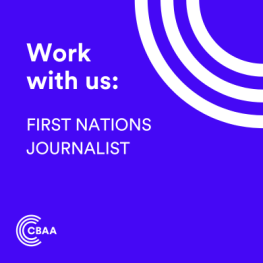
POSITION: First Nations Journalist, Canberra ACT
Only applicants who are of Aboriginal or Torres Strait Islander descent can submit their interest.
- Are you passionate about storytelling and covering political issues from a First Nations' perspective?
- Fixed Term, 12 months
- $80,000 Package (capped relocation costs will be considered)
The Community Broadcasting Association of Australia in partnership with the National Indigenous Radio Service and the Koori Mail are looking for expressions of interest from Aboriginal or Torres Strait Islander journalists to join our small news team in Parliament House, Canberra.
Whether you are an experienced journalist looking for a chance to tell real stories for the community or looking to build your skills in this area, send us a short letter about your passion for storytelling and political issues, your relevant skills, and your ability to lead stories and work in Canberra with a small team.
To express your interest, submit your short letter to the News Director, via the "Apply Now" link here by the advertised closing date or you can email [email protected] using the subject line: First Nations Journalist application.
The filling of the position of First Nations journalist is intended to constitute a special measure under section 8 and Article 1(4) of the Schedule of the Racial Discrimination Act 1975 (Cth) and section 27 of the Discrimination Act 1991 (ACT). The position is therefore only open to applicants who are First Nations persons.
Facebook comments